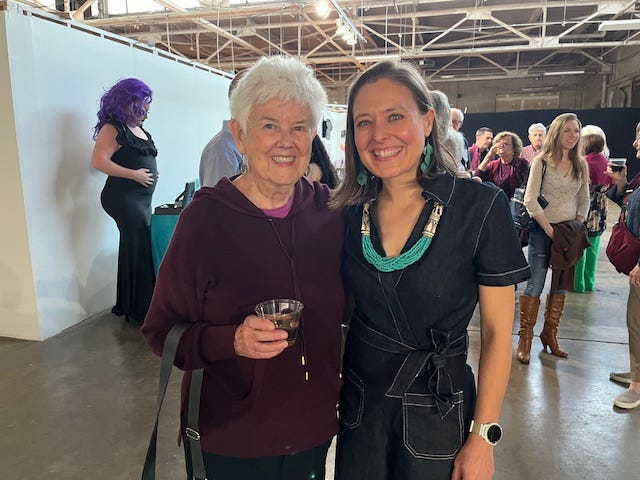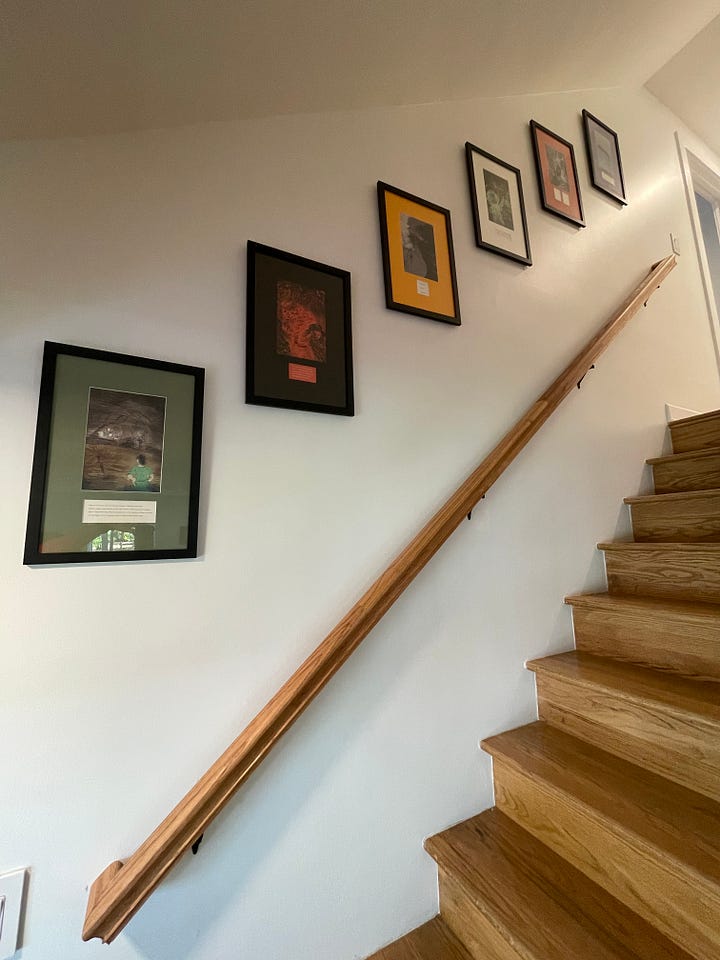What are you reaching for from your little boat?
GRAB A COPY OF IRENE HONEYCUTT’S MOUNTAINS OF THE MOON
I loved hearing my beloved poet friend Irene Blair Honeycutt read from her fifth collection of poems, Mountains of the Moon, at her packed book launch at Charlotte Lit. The launch was moved from December to February because she broke her wrist. She still wore a brace at her launch. When I saw her, I explained why it’s taken me so long to get this newsletter written and apologized. She apologized for not responding to an email I’d sent her and we talked about moving sloooowly—beneath our words, the shared understanding of what it is to have more life in you than your body can hold. Before she read, she looked out at me, sitting in a row near the back. I grinned and a sparkling smile spread over her face. I pulled for all of that life to break through—and it did.


Irene’s tone in Mountains of the Moon is steady and grounded, even as she mourns: “Death will always arrive/ carrying its tattered calendar”. There’s a powerful attention at work and the wise, loving insight of the contemplative. Also, a porch-stories accessibility born out of growing up in the South and working as a beloved professor at Central Piedmont Community College for 36 years. At Irene’s packed launch, it was clear I’m not the only one charmed by her warmth, strength, and sparkle. I think her strength enables her warmth.
Many have written beautifully about the nature poems in Mountains of the Moon. I did take comfort during a solitary fall in imagining, as I read, Irene wandering the woods surrounding her Jonas Ridge mountain cabin during pandemic exile, walking and scribbling in a notebook like Mary Oliver. And as Hurricane Helene hit Western North Carolina, her poems about the ravaged earth and what remains were especially resonant.
Most of the praise for Mountains of the Moon comes from poets, one of whom “often dislikes prose poems”, but celebrates some of Irene’s. As someone who likes my stories and lyricism intertwined, Irene’s narrative poems about relationships and community were my favorites. I loved “Tea at My Potter Friend’s Wind Gather Cabin, Jonas Ridge NC”, in which she talks art and life with her mountain neighbor during the pandemic. They wear wool sweaters and masks on the porch as “heavy rainfall pounds the ground”. Irene’s potter friend opens Pepperidge Farm cookies with nitrile gloves. The potter describes “rushing to the ashes to see the pots”/ … The thrilling part. How the unknown/ shapes itself.” As they hike together, Irene’s friend “confesses: At 84 I’m beginning to feel a bit old, but I don’t tell everyone/ that. So many don’t know what a hike is. It’s in the blood./ And the will to just carry on.”
So much of what I hold sacred is in this poem: friendship; conversations about art and how it gives shape to the incomprehensible; the kind of intimacy a forest hike makes possible—the freedom to reveal something heavy, then pass through it together; how far the spirit can carry the body.
“You Entered My Car Years Later” is another of my favorites, about music threading lovers across lifetimes. “You entered my car years later/ when Schubert’s Trout Quintet was playing/ as if there’d be no ending,/ the piano picking up where we’d left off.” … “And here we were again/ as if there’d been no ending—/ the melody pulsing/ beneath Serkin’s fingers/ and all those trout swimming.”
Another poem about a relationship that I love is “Beginning an Elegy (for Margaret)”, written in third person voice about a closeness between a professor and student that hedges toward more than “Consoler. Mentor. Confidante”, but stays “within the margins” even as the student tries “to capture the images/ her fierce mentor had stirred to life.”
Of course I loved “A Way into the Trees”, about friends reading a poem beneath cherry trees shedding their petals. And “Poetry Reading at an Indian Trail Café”, about an impromptu tailgate reading when a venue is unexpectedly closed. What small press author hasn’t experienced gratitude for the people willing to stay and listen through imperfect conditions?
I highly recommend Mountains of the Moon—for its warm, tough, sparkling wisdom and its stirring mix of story and poetry. It made for much-needed company this fall. My partner Niteesh’s father’s health had been declining for years and he spent the month of June in India caring for his parents. After the frenzied lead-up to my spring book launch and the NYC events that followed, my body was too wrecked to travel with him in June. I love so much about India, but the water and foodborne bacteria that cause traveler’s dysentery in even the healthiest of bodies, and the difficulty of accessing the diet that enables me to function and public space in which to exercise, mean managing autoimmune flareups throughout my visits. When Niteesh’s father’s health took a turn for the worst in late August, Niteesh dropped everything to fly back to Bangalore. I tried to fly with him, but my travel visa was denied without explanation.
I saw Niteesh off and reapplied for a visa without success. I paid to change my flight to the next day, and then the next, hoping my visa would come through, waiting with my suitcase packed. I called, but could not reach the embassy. Modi’s Hindu nationalist state is cracking down on journalists and writers. While we’re hardly Arundhati Roy, we noticed, on the day that my visa was denied, multiple visits from Mumbai to Freedom Tunnel Press’s project page on an anthology of resistance against the rise of fascism in India. (And now this is happening in the US.)
Niteesh ended up spending four months in India. Four months is a long time—longer because I had no sense of when he would return home; no sense of whether my visa would be approved and allow me to join him; and no sense of what our future together might look like—we’d talked about the possibility of his mother living with us after his father died.
We temporarily removed the anthology of resistance page and I reapplied for my visa as a teacher, rather than a writer. My visa finally came through in time for me to see Niteesh’s father in mid-October, when he was still well enough to spin stories at the dinner table. I was able to be there for Niteesh and his family when he died, for which I’m grateful.
But in those lonely, uncertain months before my visa was approved, inside the bodily struggle I now know was untreated Crohn’s disease, I wrote to Irene. Like a true poet, she offered just the words I needed:
“Yes, I can see your life changing,” she wrote back. “The ever-changing river! We are unmoored. What do we reach for floating past us in our little boats?”
Her words made me think of Lucille Clifton’s “blessing the boats”. And of the rivers threaded through my novel, Country of Under: Pilar and Carlos canoeing through the resaca—that watery black eye in which they create their futures. I thought of Carla’s revelation during Make the Road’s Trans Latine March:
Carla thought of Dr. Yoon saying that qi—the life force—flowed like rivers through the body. She thought of the rivers running through the bodies in the march, all flowing into a single river sweeping through the streets of Jackson Heights.
She thought of parking by the Rio Grande with Pilar, how that place on the riverbank, her sweaty body in a silk dress, let them tell each other what they’d never told anyone. Everything ran back to that beautiful, filthy river—always in motion, always changing, always a constant in her life. It held her hopes and losses, past and future. When it rained, the border shifted. Carla wanted to move like that.
She reached back to her origins for a rebirth at once feminine and masculine, old and new, borrowed and blue. She submerged herself in the river of chanting marchers and baptized herself Río.
We finally got around to hanging six drawings over our stairs from Laurie Anderson’s Night Life, a book that found its way into Country of Under. These drawings represent, for me, the creative process. Irene’s words made me think of the drawing with four women on a couch floating down a river in the fog. Maybe the women are friends, loved ones, ancestors, versions of myself.


The caption reads: “I’m not sure whether they’re people I know or people from paintings. I really wish I could go with them but there’s no room on the couch. I shout but they don’t seem to hear me.” This drawing reminds me of the drifting out that happens when I’m immersed in writing—the distancing in order to, ultimately, draw close to the heart of things. Ocean Vuong beautifully articulates this drifting “into a space removed from yourself, removed from your personhood into a deeper, mysterious selfhood” in his interview with Mike Mills, one of my favorite filmmakers: “You're no longer person, species, but a consciousness. And when you start working really well, your heroes walk out of the room, your family that you fret over… they start to walk out of the room, your enemies walk out of the room, your bullies, the people that doubt you. When you're really hitting the horizon of your inquiry, you're asking the questions that can't be answered, but you're showing up every day to it. You're chasing that horizon. Pretty soon, when you’re really hitting it, even you walk out of the room and you're floating. You're just a consciousness following the question, and I think that is the greatest feeling on Earth.”
Unmooring can be creative if we let the pain of change, loss, and death connect us to the larger suffering of the world and questions of existence.
The truth is I’m interested as much in Irene’s being as in her books—in her life as a strong, independent woman who came of age in the South in more repressive times, in how she’s moved through significant losses and health challenges to find strength and joy in solitude and community and through art, teaching, and nature. She founded the Spring Literary Festival (renamed Sensoria) in 1993; and over the 29 years that it ran, the festival brought incredible authors, including Tracy K. Smith, George Saunders, Mary Oliver, Joy Harjo, Mark Doty, Amy Bloom, Natasha Trethewey, and Yusef Komunyakaa, to Charlotte.
I shared Irene’s question with Niteesh while he was in India and—adrift in our faraway oceans—we talked about what we were reaching for, from our little boats. I’m still thinking about Irene’s question, still reaching.
Recently, she sent me this stunning prose poem by a queer poet with Crohn’s disease, saying it made her think of me. Sometimes we communicate through poems, she wrote. I wish everyone a friend like Irene who communicates through poems. I think of the poet Franz Wright saying as he died: “The opposite of fear is a poem.”
What are you reaching for from your little boat during these difficult times? Please go get yourself a copy of Mountains of the Moon. You can see Irene read and get your copy signed at the events below:
April 23, 2025: Waterbean Poetry Night at the Mic, Charlotte, NC
Irene Honeycutt will be featured at Waterbean Poetry Night at the Mic, starting at 7:00 PM. This event offers an intimate setting to experience her poetry live.
June 29, 2025: NC Poetry Society Reading at McIntyre's Books, Pittsboro, NC
As part of the NC Poetry Society series, Irene Honeycutt will read alongside poets Joseph Mills and Michael Dechane. The event is scheduled from 2:00 PM to 3:00 PM at McIntyre's Books, 220 Market Street, Fearrington Village, Pittsboro, NC
Sending love from my little boat to yours,
-Brooke

